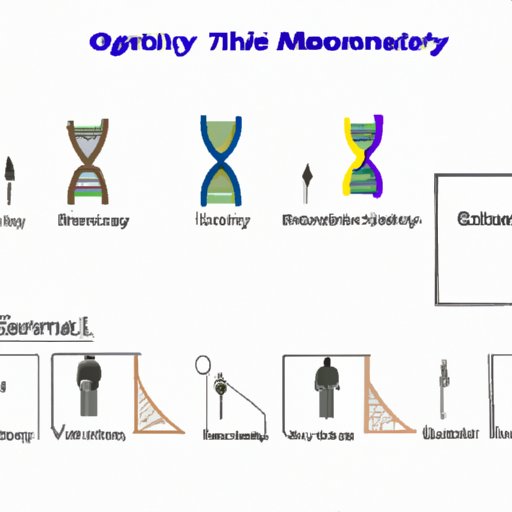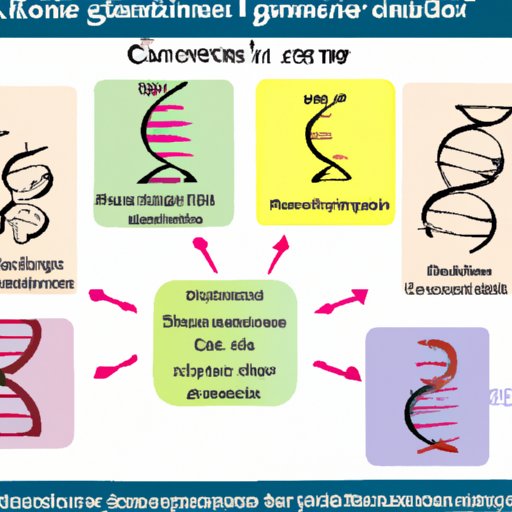Introduction
Heredity is a fundamental concept in science that explores how traits are passed down from one generation to the next. By understanding the processes of heredity, scientists can gain insight into how life evolves and adapts over time. In this article, we will explore the basics of heredity in science, examine its impact on human development, investigate the role of genetics, and unpack the complexities of heredity and its implications in evolutionary theory.
Exploring the Basics of Heredity in Science
What is heredity? Heredity is the passing of genetic information from parents to their offspring. This process is responsible for the similarities and differences between generations, as well as for the diversity of species on Earth. Heredity plays an important role in the development of organisms and has implications for evolutionary theory.
There are two types of heredity: sexual and asexual. Sexual heredity occurs when genetic material is passed from two parents to their offspring. Asexual heredity occurs when only one parent contributes genetic material. Both types of heredity involve genetic inheritance, which is the transmission of genes from one generation to the next.
Genetic inheritance is responsible for the physical characteristics, or traits, that are shared between generations. These traits are determined by the genes that are passed down from parent to child. Genes are the basic units of heredity and are composed of DNA, the molecule responsible for storing and transmitting genetic information.

The Impact of Heredity on Human Development
Heredity plays an important role in human development. Physical traits, such as eye color and hair color, are determined by the genes that are inherited from each parent. These traits are expressed in the phenotype, or outward appearance, of the individual.
Heredity also influences behavior. Studies have shown that certain behaviors, such as aggression and impulsivity, can be passed down from one generation to the next. While some behaviors are influenced by environment, research suggests that heredity plays a role in determining certain aspects of behavior.

Understanding the Role of Genetics in Heredity
Genetics is the study of heredity and the variation of traits between generations. Genes are the basic units of heredity and are composed of DNA, the molecule responsible for storing and transmitting genetic information. Genes are located on chromosomes, which are structures that contain hundreds or thousands of genes.
Gene expression is the process by which genes are turned on or off. This process determines which traits are expressed in an organism. Gene expression is regulated by several mechanisms, including transcription, translation, and epigenetic modification.

Investigating How Heredity Affects Life on Earth
Heredity plays an important role in adaptation and evolution. Natural selection is the process by which certain traits become more common in a population over time. This process is driven by heredity, as individuals with favorable traits are more likely to pass those traits on to their offspring.
Heredity also influences biodiversity, or the variety of species on Earth. By understanding the processes of heredity, scientists can gain insight into how species interact and how they adapt to their environment.

Examining the Influence of Heredity on Human Health
Heredity plays an important role in human health. Certain genetic disorders, such as cystic fibrosis and sickle cell anemia, are caused by mutations in genes that are passed down from parents to children. Genetic testing can be used to diagnose these disorders and provide information about the risk of passing them on to future generations.
In addition, heredity can influence the risk of developing certain diseases, such as cancer and heart disease. By understanding the role of heredity in human health, researchers can develop better treatments and prevention strategies.
Exploring the Implications of Heredity in Evolutionary Theory
Heredity plays an important role in evolutionary theory. Mutations are changes in the genetic material that can lead to new traits being expressed in an organism. These mutations can lead to speciation, or the formation of new species. Natural selection is the process by which certain traits become more common in a population over time. This process is driven by heredity, as individuals with favorable traits are more likely to pass those traits on to their offspring.
Unpacking the Complexities of Heredity and Its Role in Science
Heredity has many applications in medicine and other fields of science. For instance, genetic engineering is the manipulation of genes to produce desired traits. This technology has the potential to be used to treat genetic disorders, produce new medicines, and create more efficient crops.
Current research is focused on understanding the complexities of heredity and its implications in evolutionary theory. By studying the processes of heredity, scientists can gain insight into how life evolves and adapts over time.
Conclusion
In summary, heredity is a fundamental concept in science that explores how traits are passed down from one generation to the next. Heredity plays an important role in the development of organisms, adaptation, and human health. By understanding the role of genetics in heredity, scientists can gain insight into how life evolves and adapts over time. Current research is focused on unpacking the complexities of heredity and its implications in evolutionary theory.
By exploring the basics of heredity in science, we can gain a better understanding of the processes that shape life on Earth. Heredity is a complex and fascinating concept that has far-reaching implications for our understanding of the world around us.
(Note: Is this article not meeting your expectations? Do you have knowledge or insights to share? Unlock new opportunities and expand your reach by joining our authors team. Click Registration to join us and share your expertise with our readers.)
